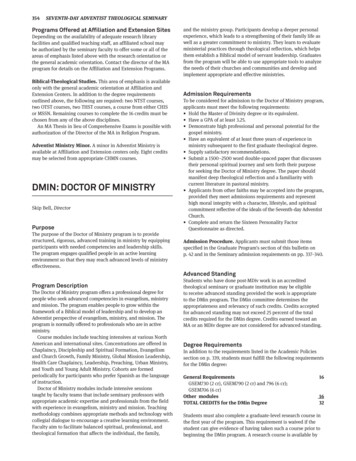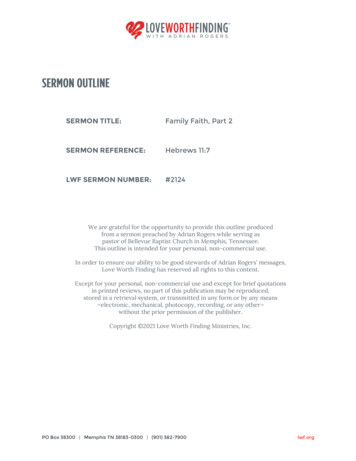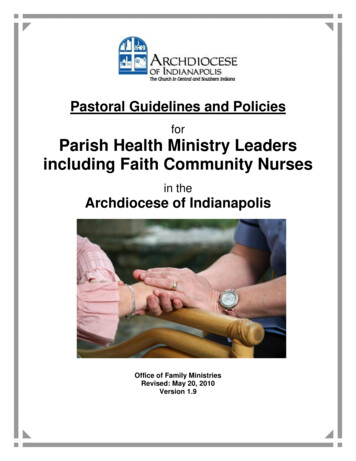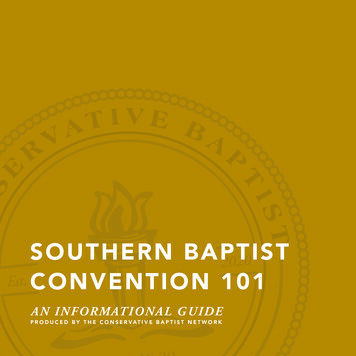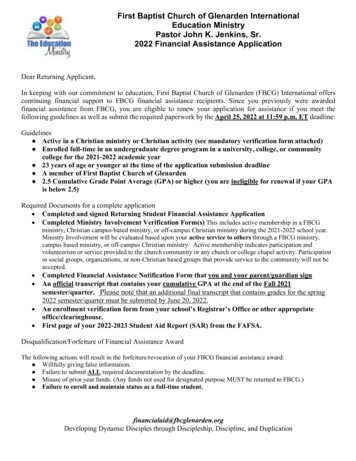
Transcription
Faith Ministry Training InstituteStudent InformationA Word From the DirectorWelcome to the ProcessThank you for your interest in Faith Ministry Training Institute.This booklet was prepared to give you a basic understanding ofthe concepts that motivate and regulate FMTI. Our desire is tohelp you find your God-ordained place of service and become aseffective as He created you to be. God has a purpose for yourlife, and it is GOOD!We began developing these ideas in the mid-1980’s and havecontinued to hone them in our own churches as well as in othernations.Pastor Virgil L. StokesDirector, FMTI2
FMTI Student ManuelTable of ContentsA Word From the Director2FMTI: The How and Why4FMTI: Preparation on Three Levels10Believer’s Level Courses10Servant Level Courses12Leadership Level Courses15Enrollment Information and Costs17Logging In To Your Class18Completing Homework18Contact Information18FMTI Student Checklist193
FMTI:The How and WhyTurning Fannies into LaborersMatthew 9:35-3835 Then Jesus went about all the cities and villages,teaching in their synagogues, preaching the gospel ofthe kingdom, and healing every sickness and everydisease among the people.36 But when He saw the multitudes, He was movedwith compassion for them, because they were wearyand scattered, like sheep having no shepherd.37 Then He said to His disciples, “The harvest trulyis plentiful, but the laborers are few.38 Therefore pray the Lord of the harvest to send outlaborers into His harvest.” NKJVNow, as then, the Lord cannot possibly reach all the broken andconfused sheep without some human help. He sees themiserable condition of the human race and His great heartbreaks within Him. The harvest remains plenteous, but thelaborers are still insufficient.In our world today there is no lack in church attendance or ofprofessing Christians. We have an abundance of potentiallaborers sitting in seats on Sunday or watching TV from thecouch. Our dilemma lies in moving the pew-sitters into theharvest field. I call this “Turning fannies in the pew intolaborers in the harvest.”Most of us have come to see ministry as something that requiressending potential ministers to a distant Bible school in order tolearn the professional sophistication necessary to carry out theircalling. While this is a system that has produced some fineministers, it is our conviction that this misses the point of NewTestament ministry.By concentrating on a professionally prepared clergy wediminish the impact of the 95% of God’s people who are notcalled to vocational ministry, but are gifted by God for dynamicservice in and through the local church. Every Christian has a4
calling from God to serve at some level. Some want to becomemore proficient in what they are already doing in the localchurch. Others sense a leading to move into new areas ofministry within the Body but feel unqualified. Still others dohave a call to full-time ministry, but because of theirresponsibilities here, cannot leave to attend Bible School. FMTIis for these people; people who want to grow in ministry whilemaintaining their relationship and service to their community offaith.Our Present Methods are FlawedAs long as I can recall, the primary method of training ministershas been to send them away to Bible School. The first problemwith this is that it rips apart the relationships that are formed inthe local church and community. At a time when an individualis taking giant strides in his spiritual life, he is without thesupport systems God provided to help resist and overcome theinevitable assaults of Satan.The second problem is that Bible schools are not real. TheKingdom is lived out in the local church. Local churches are notgenerally comprised of high percentages of full-time Biblestudents. Though many Bible schools have churches associatedwith them, these churches are typically driven and manned bypersonnel and students of the school. As most graduates soondiscover, the real world is very different.Because students come from many places and stay for only ashort stint, relationships with instructors are usually distant.Instructors are high and holy and we know little of their lives.The reverse is also true. It is often possible for a student tofinish school without having his life examined by leadership inany way other than class attendance and test scores. Becauseof the lack of close personal contact with leadership, studentsare often pushed into a mold of ministry that is theoreticalrather than real and takes no genuine account of individual giftsand callings. If nobody knows you, they cannot be expected toguide you in the way you should go.Finally, a student at a Bible school is destined to come awaywith an impartation of attitude and anointing that flows from theleadership of that particular institution. They will be immersedin the vision of the leadership and learn to flow in the Spirit of5
that group. For the pastor of the local church, this often bringsproblems when the student returns. Every local church has aunique flavor, a vision and an anointing all its own. Thelaborers God plants there should be raised up as fruit thatreflects the tree from which it came. When we send students offto Bible school we graft them into another tree where they takeon the characteristics of that ministry and may never flowproperly in ours again.On the other extreme of ministry preparation, we have the groupthat says, “God called me, and I will not confer with flesh andblood. I’m like Paul.” These dear folks are found everywherefloundering in unfruitful service or even doing harm to thosethey try to touch. They simply haven’t the tools or theexperienced guidance that could make them effective.Between the two extremes lie the vast majority of Christians.Every Christian has a calling from God. All are called to serviceat some level. Some need to become more proficient in whatthey are doing in the local church. Others sense a leading tomove into new areas of ministry within the Body, but feelunqualified. Still others have a call to full-time ministry, butbecause of their responsibilities to family and community,cannot leave to attend Bible School. FMTI is for these people,people who want to grow in ministry at any level.Seeking a Bible Standard for Ministry Training1 Timothy 3:14-1514 These things I write to you, though I hope tocome to you shortly;15 but if I am delayed, I write so that you may knowhow you ought to conduct yourself in the house ofGod, which is the church of the living God, the pillarand ground of the truth. NKJVThe Scripture places the responsibility of the dissemination ofthe Gospel squarely at the door of the local church. In thispassage Paul is addressing a local congregation concerning someissues of order. In that context he tells them that their church isthe foundation from which truth must be proclaimed. Thelanguage seems to imply a role in both protection and propagation. We begin by accepting our responsibility as a localassembly to prepare people for ministry.6
Having accepted our role as trainers, we must then say, “who dowe train?” The only Bible answer is “everyone who believes.”Peter tells us that “each one has received a gift” and that each isto be a good steward thereof (1 Peter 4:10). The second step inbecoming the trainers we should be is recognizing theimportance of the gifting in every member of the Body.There are any number of wonderful programs available fordiscipling believers and training workers in the local church.All have advantages and disadvantages. No matter what themethod, it must include at least three ingredients to reflectbiblical principles:1. Instruction in sound doctrine.2. Mentoring through personal contact.3. Practical experience in ministry.Instruction in sound doctrine is common to Bible schools of alltypes, but is primarily the function of a local church. Paul wroteto Titus that in the selection of bishops he should look in thelocal congregation for those who have been taught sounddoctrine (Titus 1:9). In Acts 15 we find that the great issues oftheology, in this case the admittance of Gentile believers, werediscussed and decided in the context of a local assembly. Theidea that ministry training should include sound doctrine is notdebated. The issue is where this instruction should take place.There is more to ministry training than instruction in facts.The Bible gives a picture of training through mentoringrelationships. Elijah and Elisha, Moses and Joshua, Jesus andthe 12, Barnabas and Saul, Paul and Timothy: It is a Bibleconstant. Webster says that a mentor is a wise, loyal advisor,a teacher, or a coach.Mentoring includes the ideas of training and modeling. Jesussaid that a pupil who is fully trained will be like his teacher(Luke 6:40). This means that he becomes an imitator in methodand mentality. A mentor demonstrates techniques, discussesdifficulties, and models values. This requires personal contact.Ministry is more than information; it is impartation. Notice inRomans 1:11 Paul said he was longing to see the RomanChristians “that I may impart to you some spiritual gift, so thatyou may be established.” Though the very letter he was writingwas inspired scripture, he said that reading it would not be7
sufficient. There are some things that can only come byimpartation. Some things of the Spirit are caught, not taught.Mentoring relations provide opportunity for impartation.A third aspect of mentoring is accountability. The NewTestament repeatedly exhorts us to submit to those who are overus in the Lord. This requires being related to them in a personalway. The requirements for ministry in the New Testament areprimarily stated as character traits. We can never discerncharacter by multiple-choice exams or by saying “hello” beforeservice. There must be contact and interaction, requirementsand execution, correction and amendment, in order to developand assess character.Practical experience in real ministry moves a student fromtheory to reality. The Bible student needs a place to get afirst-hand picture of how church actually works. There arevalues, principles of human interaction, and practical skills thatcan only be learned on the job. Jesus sent out the twelve thencritiqued them on their return. Barnabas gave Saul anopportunity at Antioch. There is a confidence that only comeswith actual performance and feedback.From conversion to harvestThe local church has an obligation to move believers through theprocess of growth in Christ. This process is three-fold. Mostchurches agree we should make converts. By instruction in theWord and a call for commitment, we make converts intodisciples. We must not stop there. We must take disciples andmove them into ministry, into the harvest.Committed Christians want to fulfill their calling. They often failto try because they do not feel competent. Competence breedsconfidence. When combined with commitment to the work ofGod, competence and confidence produce people of realsubstance who will make an ongoing impact wherever theyserve. This is the essence of Faith Ministry Training Institute.FMTIonline.com was created to assist students that don’t haveBible School available to them within their local church orcommunity, and for churches that desire to have additionaltraining available for their members but lack resources (time,facility, personnel) necessary to make it available. We desire toassist local churches by helping develop their future leaders.8
Ministry Training at FMTICompetence — Confidence — CommitmentCompetence means I know what to do.We develop competence by: Teaching the essentials of the Christian faith, thegreat truths that make us Christians. Exploring the distinctive practices and doctrines thatmark us as a Spirit-filled, faith-driven people. Imparting essential skills in Bible interpretation,ministry ethics, and practical ministry expertise.Confidence comes through experiences that tell me I can do it.We develop confidence through: Mentoring in ministry experiences through personalcontact with leaders and workers in the churchenvironment. Giving guidance in applying principles and supplyingfeedback. Encouraging risk-taking in planning andimplementing new ministry ideas with the guidanceof a mentor.Commitment is an attitude that says I will finish my course.We inspire commitment through: Keeping the student committed to the local churchand church family. Demonstrating ministerial excellence andfollow-through. Giving opportunity to plan and implement ministryprojects.9
The Plan of Study and CourseRequirementsFMTI: Preparation on 3 LevelsFaith Ministry Training Institute is divided into three levels ofpreparation. We use the term “level” instead of “year” becausethe courses are designed to be completed as the student is ablerather than on a strict time schedule. The first, our BelieversLevel, consists of eight courses that are all required forgraduation. Levels 2 and 3 include elective and requiredcourses as well as guided practical experience.Level ONE: Believers LevelThe first level of training is designed to impart fundamentalChristian doctrine, believer’s ministry skills, and key studyskills. This is the essential foundation upon which all else isbuilt. Every Christian who wants to be effective for God canbenefit from these courses.Requirements for completion of the Believers Level:128 class hours with reading and assigned homework.The Believer’s Level consists of 8 courses with 16 class-hourseach. In addition to class attendance, homework and readingassignments are required. The following 8 courses are requiredfor completion of the Believer’s Level.Foundations of Faith 16 hours reading andhomework. An overview of essential Christian doctrine.The inspiration of the Scriptures. How to study andinterpret the Bible. The nature of God. Creation. Basicsof Christology. The Fall and Redemption. Things toCome.Christian Character for Ministry 16 hours readingand homework. Character traits for successful ministry.The Believer’s Ministry. The meaning of faithfulness.Godly servanthood. Courage for the battle. Flow ofauthority. Increasing the anointing through submission.Practical helps for dealing with people.10
Biblical Faith 16 hours reading and homework.A careful look at the Bible message concerning faithevidenced by obedience to God’s Word and Spirit. Theprinciple of confession. Faith that springs fromrelationship with God. Using your faith to please Godand inherit Bible promises while avoiding the pitfalls ofthe so-called “Faith message.”Redemptive Truth 16 hours reading and homework.A study of what Christ has done for us. Practicalmethods for living in the benefits. Understanding theconcept of covenant. Renewing the mind concerning theblessings inherent in the New Covenant. The believer’sauthority and power in the Name of Jesus. Finding aplace of service in the church. Receiving the ministrygifts.Healing Truth 16 hours reading and homework.Biblical basis for healing and ministry to the sick. Thewill of God concerning healing. Methods of administeringhealing. Major hindrances to healing. Understandingthe healing ministry today.Money, Ordinances, and Music 16 hours reading andhomework. Ordinances instituted by the Lord Jesus,and 2 areas of confusions in Charismatic ministries.Serving the Lord’s Table. Administering Water Baptism.Principles of financial stewardship and biblicalprosperity. Spirit-filled praise and worship.Holy Spirit 16 hours reading and homework.The person and functions of the Holy Spirit. The NewBirth compared with the Baptism of the Spirit.Supernatural manifestations of the Spirit. Operating inthese manifestations as the Spirit wills. Judgingprophecy and ordering the operation of the spiritual gifts.Practical helps for supernatural ministry.Practical Ministry Skills 16 hours reading andhomework. Practical ministry to the most commonneeds. Preparing to minister. Ministry of the New Birthand the Baptism with the Holy Spirit. Ministering to theSick. Helping those with mental & emotional difficulties,marital difficulties, financial problems, andlife-controlling habits.11
Level TWO: Servant LevelThe second level of training is designed to prepare the studentfor ministry. Emphasis is on functioning in a useful way in thelocal church, understanding the roles and anointing of differentministries, and following the Holy Spirit in personal andministerial life. The Servant Level student should begin to thinkfrom a ministry perspective.Requirements for completion of the Servant level:1. Completion of the Believer’s Level.2. Two Mentored Ministry Experiences.3. 64 Upper Level class hours including:Life in the Spirit 16 hours reading and homework.Developing the believer’s relationship to the Holy Spirit.Sensitivity to the work of the Holy Spirit as well as thedevelopment of the human spirit. We will look at theimmediate effects of the new birth, growth of the spiritperson, and Christian maturity. Specific attention will bedevoted to recognizing the leading of the S(s)pirit andresponding to the correction of the Lord.Panning for Gold 8 hours reading and assignments.Verse-by-verse studies of Bible books will be regularlyoffered. The Bible text will vary from term to term, butthe methods will not. Each Servant level graduate musthave the experience of seeing accurate interpretation andteaching methods in practice. These courses will beacceptable as elective credit as well.At Least one course from the following Ministry EmphasisCurriculum:The Ministry of Helps 8 hours reading and assignments. The necessity and importance of non-pulpitministries. Attitudes and training. Biblical basis for theministry of helps. Qualifications of the helps minister.Ministry Gifts 8 hours reading and assignments.Purpose and nature of the five-fold ministry. Keys toreceiving God’s blessing through the ministry gifts.Attributes and job descriptions of the Apostle, Prophet,Evangelist, Pastor and Teacher.12
Marriage, Divorce and Remarriage 8 hours readingand assignments. Our world is filled with people who aresuffering the effects of divorce. The church reflects thesociety. This has caused much confusion and pain forhonest believers. This course offers practical assistanceto those facing divorce, contemplating remarriage ordesiring to serve God but are unsure if they are qualified.Some issues addressed are: Biblical grounds for divorce,ministry to problem marriages, living with an unbeliever,the pitfalls and joys of remarriage, and marriage and theMinistry.Victory over Addiction: Ministering to alcoholics,addicts and their families 8 hours reading andassignments. This class will help the addict stay freeand find their place in the local body, help empower thefamily in how they can help, and help the Churchbecome more effective in working with addicts. Sometopics covered will be: What is an alcoholic? Is addictiona disease or a sin? How does addiction affect the family?How can I help my loved one? What about AA and othersupport groups? Requirements for recovery. What canthe church do?Preparing to Preach 8 hours reading andassignments. The essence of ministry is the publicproclamation of the Word of God. Christians are askedto do this on many levels from the home all the way tothe pulpit. This class will help the student in preparation of a well-organized message. We will address theissue of stage fright and give some practical help inpublic speaking. The course will emphasize dependenceon the Holy Spirit and give practical help in learning toflow in the anointing of the Spirit.Ministering to the Tormented 8 hours reading andassignments. Much of ministry has to do with helpingpeople who are in great distress. This course will explorethe basis for mental and emotional torment, be itspiritual, mental, or physical. The student will learn howto discern if a person is being tormented because of aphysical problem, a mental problem or a demonic entity.He will acquire skills that will assist him in helping theindividual regardless of the source of the problem.13
Biblical Money Dynamics 8 hours reading andassignments. There has been great debate in the Churchworld over the will of God concerning financial blessing.Many books and seminars focus on sowing and giving,but fail to emphasize the reaping aspect of the spirituallaw. Rev. David Mallonee’s Biblical Money Dynamicsseminar will help the believer to find the disconnectbetween their sowing and their reaping. Some of thetopics covered will be: Why money flows to some andaway from others? How Bible characters multiplied money. Connecting your reaping to your sowing. Your relationships and your money. And much more **Other Ministry Emphasis courses will be addedregularly which will satisfy this requirement.ElectivesThere are many other Servant and Leadership Level courses notincluded as specific requirements for completion of either level.These courses are regarded as electives and may be applied tothe total hour requirements for the Servant and LeadershipLevels. For complete course titles and descriptions visitFMTIonline.comMentored Ministry Experiences—(Two of these are required.)The student must make an appointment with a faculty member inorder to begin this requirement. With the help of a facultyadvisor, the student chooses an area of ministry in the localchurch. He/She then works in that area for one month,spending as much time as possible with the leader of theministry. They become as familiar as possible with the planningnecessary to carry out that leader’s functions, as well as actuallyserving in that department as needed. At the end of theexperience the student will complete and submit the MMEReport (Mentored Ministry Experience Report) form to his/herfaculty advisor.14
Level THREE: Leadership LevelThe third level of training is aimed at the person makingpreparation to step into full-time ministry or serve in leadershipin the local assembly. The student will focus on effectiveleadership and ministry skills.Requirements for the completion of the Leadership Level:1. Completion of Levels ONE and TWO.2. One Ministry Leadership Project.3. 32 Upper Level class hours including:Planning for Success 8 hours reading andassignments. Good ideas are plentiful. Turning theminto reality is rare. We need to know if the idea is fromGod and how to take effective action to bring it topass. Students will learn to discern the leading of God,set godly priorities, make good decisions and use timewisely. In addition you will learn a simple method fororganizing, planning, and implementing a project thatwill work for you at home, at church, and on the job.This is a primer course in ministry project management.Ethical Ministry Management 8 hours reading andassignments. God wants your ministry to be clean.A primer on handling money in ministry. Avoiding theappearance of evil. Leading without manipulating.Safety with the opposite sex. Basic principles of churchgovernment.Ministry Leadership ProjectEach Leadership Level student will be required to planand implement an individual ministry project. This willentail praying and receiving an idea for ministry fromGod, writing the vision and the plan, recruiting andtraining personnel, raising financial support,coordinating with the local church, and carrying out theproject. Each step will be carried out in collaborationwith a Faculty Advisor.Other courses and opportunities may be offered at any time asthe Lord directs. Outside speakers with special expertise will beused as they are available. God has given us a framework and adirection. We reserve the right to be flexible within thatframework.15
Additional Course InformationAll courses are designed to “stand alone.” That means you mayenroll in any course without having taken any previous course.It is best to begin in the beginning, but not required.ElectivesThere are many other Servant and Leadership Level courses notincluded as specific requirements for completion of either level.These courses are regarded as electives and may be applied tothe total hour requirements for the Servant and LeadershipLevels. For complete course titles and descriptions visitFMTIonline.comContinuing EducationMany of our Servant and Leadership Level courses are geared toministry specific topics and issues. These classes are availablefor anyone to enroll in to take the class for credit or to simplyaudit and study the material. A number of pastors and ministryleaders often enroll in topics of interests as ongoing personalstudy or education.16
FMTIonline Enrollment InformationOnline ProgramOur online course format allows you to study according to yourschedule 24/7 as long as you have an internet connection.Can’t get away to Bible School? Our online Bible School is easyas 1, 2, 3!1. ReadEach course comes with downloadable course outline toaccompany the video instruction.2. WatchOnce you login to your course, begin watching the videoinstruction at your own pace.3. ReplySimply submit your course assignments by email orprinting them and mailing them in.How to Register for ClassesTo enroll in a class at FMTIonline.com just add the course(s) toyour cart by clicking the Add to Cart button and then completethe payment process through PayPal (be sure to include theemail address you would like to be contacted as this will be yourlogin username). Note: You do not have to have a PayPal account to complete the transaction. Visa, MasterCard, AmericanExpress, Discover, and Checks are accepted.Within 1-2 business days of receiving your payment the requiredtexts for the class(es) enrolled in will be sent to you via USPSand you will receive an e-mail from an administrator containingyour login information so you can access your course(s).CostsEach course costs 60 which includes: Course Outline,Required Reading Texts (Approx 15-25 of books are includedin your 60 course fee and shipped to you upon receiving yourcourse registration), 24/7 access to the Course Instruction,and FMTI Academic Support.DiscountsSpecial discounted rates may apply to studentsregistering for all eight Believer’s Level Courses at once.17
How to Login to Your CourseOnce you have successfully registered for your first class youwill receive an email confirmation along with your username andpassword. Simply click on the name of the course you haveenrolled in and enter your login information at the prompt.You will only have access to the courses you have enrolled in,but can enroll in additional courses at anytime.Completing HomeworkBeliever’s Level courses will have the appropriate homeworkStudy Guide in a text link located beneath the correspondingvideo. Clicking on these links will open a fillable .pdf file.Student may type their answers directly into the homeworkStudy Guide and save the file to their computer. Completedhomework can be e-mailed to your assigned FMTI Advisor to beevaluated. Students will then receive an email from their FMTIAdvisor along with their evaluated Study Guide complete withcomments so you can maintain it with your records. Note: Mostof the classes are taught in multiple hour formats. There is onlyone homework Study Guide per class within a course.Servant & Leadership Level courses with the exception of Lifein the Spirit do not have homework Study Guides to go alongwith the lessons. Specific homework instructions are given onthe Homework section of the title page of the course outline andstudents may submit the assignments via fax, email, or mail forevaluation.Questions and HelpAt FMTI we believe a teacher hasn’t taught until a student hasunderstood the material. We have FMTI staff and graduatesavailable to help answer any questions you may have.Please do not hesitate to contact us.Contact InformationFaith Ministry Training InstituteC/O FCF TucsonPO Box 89156Tucson, AZ e.com18
Faith Ministry Training InstituteStudent Requirement Check ListBelievers Level Completed Enrollment Form Complete homework and reading for all 8 Level One courses Foundations of Faith Christian Character for Ministry Holy Spirit Biblical Faith Redemptive Truth Practical Ministry Skills Money, Ordinances, and Music Healing TruthServant Level Completed Believers Level Contact Faculty regarding Mentored Ministry Experience Choose 2 areas of ministry Clear with Faculty Advisor Contact leaders of chosen ministries for training andscheduling Complete 2 MME Report forms and turn them in toFaculty Complete all class work for 64 hours of Upper Level courses Life in the Spirit (16 hours) Panning for Gold (8 hours) One class from the Ministry Emphasis Curriculum 32 additional hours (4 courses) of Upper LevelcourseworkLeadership Level Complete Believers Level Complete Servant Level Contact Faculty regarding Ministry Leadership Project Turn in proposal Amend proposal after consultation with Advisor Complete and write up project as assigned by Advisor Complete all class work for 32 hours of Upper Level courses Planning for Success (8 hours) Ethical Ministry Management (8 hours) 16 additional hours (2 courses) of Upper Levelcoursework19
Faith Ministry Training Institute Student Information Thank you for your interest in Faith Ministry Training Institute. This booklet was prepared to give you a basic understanding of the concepts that motivate and regulate FMTI. Our desire is to help you find your God-ordained place of service and become as effective as He created you to be.

